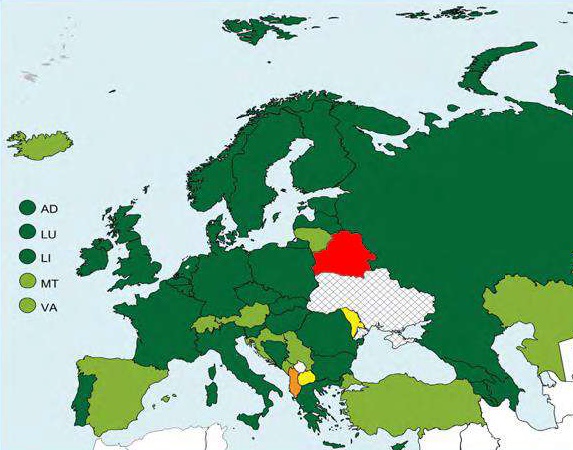Belarusian Independent Bologna Committee (BIBC) and Ad Hoc Commission of Belarusian National Platform of the Eastern Partnership Civil Society Forum (EaP CSF) continue to monitor the Roadmap implementation and commissioned the analysis of what had been done by Belarusian authorities to fulfill its obligations. This report presents the findings that show where the country stands in terms of the Roadmap implementation.
The monitoring results of the Roadmap provisions implementation were discussed at the International conference “Public participation in Higher Education modernization: civil society role in the implementation of the Roadmap for higher education reform in Belarus” held in Minsk on September 23-24, 2016.
The conference participants endorsed the Belarusian Independent Bologna Committee recommendations to amend the Education Code of the Republic of Belarus in order to implement the Roadmap provisions and accelerate Belarusian higher education modernization.
1. In order to implement the Roadmap provisions related to higher education institutions structure, National Qualification Framework (NQF), transparency instruments (Diploma supplement) we suggest to amend the Education Code, which will:
- - commit to transitioning to three-tire educational model and will describe each tire content and graduates qualification in details;
- - commit to transitioning to credit system when forming the curricula and taking into account learning outcomes as well as provides its detailed description;
- - commit to implementing NQF;
- - describes educational standards that are based on ECTS system and NQF including educational program duration and required workload for each educational cycle.
2. In order to implement the Roadmap provisions related to higher education quality assurance we recommend amending the law allowing the establishment of independent Quality Assurance Agency in accordance with the European Standards and Guidelines (ESG). Therefore, we propose to introduce a new definition of those parties participating in quality assurance process (Independent agencies, Ministry of Education and Council of Ministers), to outline their authority, to provide their activities description, frequency of those activities, internal quality assurance principles.
3. In order to implement the Roadmap provisions related to academic mobility and higher education internationalization, we propose to prepare descriptive Development and Diversification Plan (National Strategy) in this area based on the Bologna implementation criteria and indicators. We also propose to amend Education Code provisions by introducing international cooperation goals, identifying parties involved, adjusting the definition of academic mobility, committing to establish Special Fund for developing Belarusian students, faculty and administrative staff academic mobility.
4. In order to implement the Roadmap provisions related to social dimension, we propose to amend the law that will enable higher education institution to revise existing practice graduates employment studying at state funded places. Instead of ‘forced’ employment, we propose to develop a mechanism that will provide all graduates irrespectively of the study form with the first work place based on work places quotes as well as introduce professional orientation system, which will allow graduates to adjust to the situation on the labour market.
We also propose to introduce in law the commitment to ensure recognition of credits, acquired as a result of learning outside the formal education.
We recommend to establish the system of preferential loans for education available for all categories of students with the repayment schedule staring in two years time after graduation.
5. In order to implement the Roadmap provisions related to fundamental academic values, we propose to introduce into the Education Code a clause based on the Magna Charta Universitatum principles and Recommendation CM/Rec (2012) 7 provisions on the responsibility of State for ensuring academic freedom and institutional autonomy. Experts’ recommendations focused on providing:
a. Universities independence from political and economic influence;
b. Inherence of educational process from research in the universities;
c. Freedom of teaching, research and learning;
d. Reciprocal learning and multicultural cooperation.
They include exact recommendation on law amendment allowing:
- to guarantee to institutions and individuals the rights of protection against external interference by authorizes;
- to secure higher education institutions organizational, financial, staffing and academic autonomy in full;
- to conduct continuous monitoring of fundamental values implementation;
- to guarantee power redistribution in higher education institutions in favour of collegial governing bodies.
Recommendations of the Bologna Committee experts’ include precise articles and points of the Education Code where the amendments should be made. This allows to harmonize the national legislations and to bring it closer to the standards prevalent in European Higher Education Area as much as possible.
READ THE FULL TEXT OF THE REPORT in ENGLISH (PDF)

